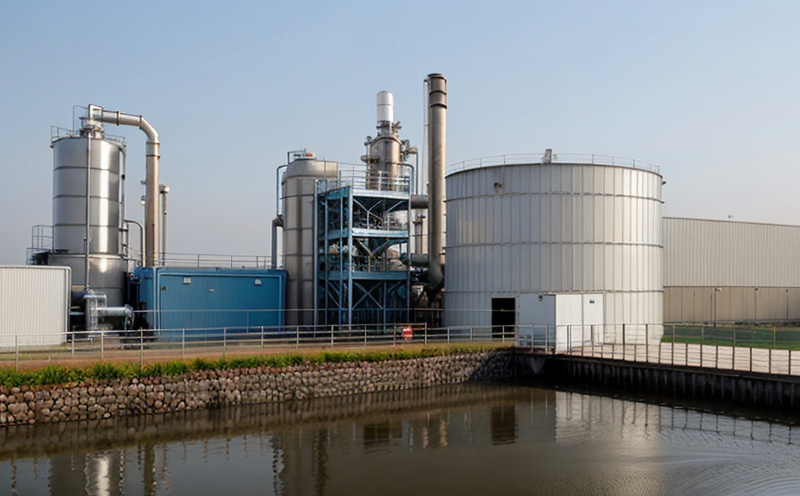ASTM D5810 Biodegradability Testing in Industrial Wastewater
The ASTM D5810 biodegradability test is a critical procedure used to assess the environmental impact of synthetic organic compounds present in industrial wastewater. This test evaluates how quickly and completely these compounds can be broken down by microorganisms under controlled laboratory conditions, simulating real-world biodegradation processes.
Understanding the biodegradability of industrial chemicals is essential for industries that generate significant amounts of wastewater. It helps determine if these chemicals are environmentally friendly or pose a risk to aquatic ecosystems. This test plays a pivotal role in ensuring compliance with environmental regulations and promoting sustainable manufacturing practices.
The ASTM D5810 test method involves several key steps: first, the wastewater sample is inoculated with microorganisms under controlled conditions. Over time, the concentration of the chemical compound is monitored to determine its biodegradation rate. The test typically runs for 28 days, allowing sufficient time for significant decomposition.
One of the primary goals of ASTM D5810 testing is to evaluate if a synthetic organic compound can be degraded within an acceptable timeframe (typically less than 10% remaining after 28 days). This ensures that any residual compounds do not persist in the environment, thereby reducing potential risks. Compliance with this standard is crucial for industries seeking to minimize their environmental footprint and ensure regulatory adherence.
The ASTM D5810 test also helps identify chemicals that may require alternative treatment methods or reformulation. By understanding which compounds are difficult to degrade, manufacturers can make informed decisions about product design and process improvements. This not only aids in reducing pollution but also enhances the overall sustainability of industrial processes.
Another significant aspect of this testing is its role in supporting research and development efforts. R&D teams use ASTM D5810 results to innovate more environmentally friendly products and processes, ensuring that new materials or formulations meet stringent biodegradability criteria before they enter commercial production.
In summary, the ASTM D5810 test provides essential insights into the environmental behavior of synthetic organic compounds in industrial wastewater. It supports compliance with regulatory standards while promoting sustainable practices within manufacturing facilities. By leveraging this testing method, industries can significantly reduce their ecological footprint and contribute to a more sustainable future.
Why Choose This Test
- Comprehensive Regulatory Compliance: ASTM D5810 is widely recognized and accepted by regulatory bodies worldwide. Choosing this test ensures that your industrial wastewater meets stringent environmental standards.
- Scientific Rigor: The test method provides a standardized approach to biodegradability assessment, ensuring consistency and reliability across different samples and facilities.
- Informed Decision-Making: With detailed insights into the biodegradability of your industrial chemicals, you can make informed decisions about product development and process improvements.
- Risk Mitigation: By identifying compounds that are difficult to degrade, you can implement targeted treatment strategies or reformulate products to minimize environmental risks.
The ASTM D5810 test offers a robust framework for evaluating the biodegradability of synthetic organic compounds in industrial wastewater. Its scientific rigor and regulatory recognition make it an indispensable tool for ensuring compliance with environmental regulations and promoting sustainable manufacturing practices.
International Acceptance and Recognition
- Global Standard: ASTM D5810 is an international standard that has been adopted by numerous countries, making it a global benchmark for biodegradability testing.
- Regulatory Acceptance: This test method is widely recognized and accepted by regulatory bodies such as the U.S. Environmental Protection Agency (EPA), European Union (EU) directives, and other national environmental agencies.
The ASTM D5810 biodegradability test enjoys widespread international acceptance due to its scientific rigor and comprehensive approach. Its global recognition ensures that your industrial wastewater testing results are widely applicable and accepted across different regions. Regulatory bodies around the world rely on this standard for ensuring compliance with environmental regulations.
Competitive Advantage and Market Impact
The ASTM D5810 biodegradability test offers significant competitive advantages to industrial facilities by providing a clear picture of their environmental impact. By demonstrating a commitment to sustainable practices, companies can differentiate themselves in the market, attracting environmentally conscious consumers and partners.
Furthermore, compliance with this standard enhances your facility's reputation as an eco-friendly operation, potentially leading to increased market share and long-term business sustainability. Companies that prioritize environmental stewardship are increasingly favored by investors and customers alike.
The test results can also influence procurement decisions, as suppliers of raw materials or chemicals may require evidence of biodegradability compliance. This not only simplifies the supply chain but also ensures that all components meet stringent environmental standards.
By leveraging the ASTM D5810 test, industrial facilities can proactively address potential regulatory challenges and stay ahead of evolving environmental regulations. This proactive approach fosters a culture of sustainability within your organization, driving innovation and continuous improvement in manufacturing processes.





